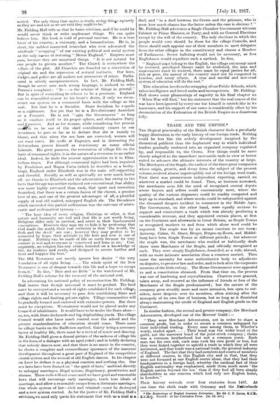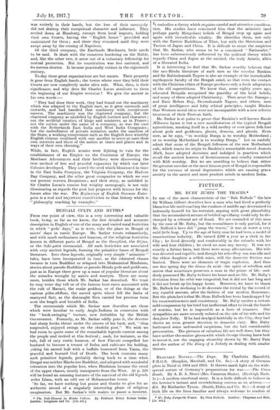TRADE AND THE EMPIRE.* Tun illogical practicality of the British
character finds a peculiarly happy illustration in the early history of our foreign trade. Nothing could be loss like the orderly development imagined by the theoretical publicist than the haphazard way in which individual traders gradually coalesced into an organized company regulated by, and responsible to, the Crown. Few things could be more closely adapted to the immediate mercantile ends in view or bettor suited to advance the ultimate interests of the country at large.
The Merchants of the Staple, the earliest of the three great companies whose origin, growth, and decay form the subject of the present volume, evolved almost imperceptibly out of the foreign wool trade.
First there was promiscuous independent exporting, carried on wherever a market could bo found. Then, as business increased, the merchants soon felt the need of recognized central depots where buyers and sellers could conveniently meet, where the quality of the various shipments could be readily compared and kept up to standard, and whore stocks could be safeguarded against the thousand dangers incident to commerce in the Middle Ages.
The Government, on the other hand, were equally anxious to support and concentrate a trade which was already producing a considerable revenue, and they appointed certain places, at first on the Continent and afterwards in Great Britain, as Staple Towns or recognized markets to and from which alone wool could be exported. The staple was by no means constant to ono town Antwerp, Calais, St, Omer, Bruges, Bergen-op-Zoom, and Middol- burg have been Staple Towns at different periods ; but wherever the staple was, the merchants who resided or habitually dealt there were Merchants of the Staple, and officially recognized as such. They were simply Englishmen, domiciled, as a rule, abroad, with no more intimate association than a common market. Then came the necessity for some authoritative body to adjudicate on disputes, to preserve law and order, and to look after the corporate interests of the little colony. The Home Government were appealed to and a constitution obtained. From that time on, the process was one of hardening and crystallization. Charters were granted.
taken away, and renewed as the influence of friends or foes of the Merchants of the Staple predominated ; but the nature of the company grew steadily more and more intensive, less open to out- siders, more despotic over its members, often striving after the monopoly of its own line of business, but so long as it flourished always maintaining the credit of England and English goods on the Continent.
In similar fashion, the second and greater company, the Merchant Adventurers, des-eloped out of the Mercers' Guild e-
" They were Merchant Adventurers, not in order to share a common profit, but in order to secure a common safeguard for
their individual trading. Every man among them, in Wheelor'e
words, traded apart. . . . Their bond was the wider bond of the guild, not the narrower bond of the joint-stock company ; theirs
was a common brotherhood but not a common purse. Each man ran his own rink, each man took his own profit or loss, but they were linked together to uphold a trade in which they all were interested, and that trade was a national trade, the greatest industry of England. The fact that they had members and courts of members at different centres, in this English city and in that, that they were not focussed at one English centre alone, that they had their headquarters in a foreign land, whereby the cardinal fact of their English nationality- was emphasized, made them much more the English elation beyond the sea' than if they had all been simply shareholders in one concern which had only one English home, in London."
Their history extends over four centuries from 1407. At one time the oloth trade with Germany and the Netherlands
et of Wig OrffS(AS Enterprise. DP aft C. P. LUIS, Cell. 1:1.7.0.1"4""401to'rd at the Clarendon Press. lb. ad. net.1
was entirely in their hands, but the loss of their monopoly did not destroy their exceptional- character and influence. They settled down at Hamburg, exempt from local imposts, holding their own Courts, having the " English house " provided and maintained for them ; and there they remained_ until they were swept away by the coming of Napoleon.
Of the third company, the Eastlands Merchants, little needs to be said. It dealt with the countries bordering on the Baltic, and, like the other two, it arose out of a voluntary fellowship for mutual protection. But its constitution was less national, and its success shorter. It became practically extinct in the eighteenth century.
To-day these great organizations are but names. Their property is gone from English hands ; the towns whore once they held their Courts are now completely under alien rule. What, then, is their significance, and why does Sir Charles Lucas attribute to them the beginning of our Empire overseas ? We give the answer in his own words:— " They had done their work, they had found out the machinery which was adapted to the English race, as it grew outwards and onwards, and had handled that machinery with conspicuous success. The machinery was the chartered company, but the chartered company as modelled by English instinct and character ; not the artificial creation of kings and ministers, as in France ; not the nation under the name of a company, as was the case with the Netherlands East India and West India Companies ; but the embodiment of private initiative under the sanction of the State, a working compromise such as the English love whereby English citizens combined with ono another to serve at once their own interests and those of the nation at times and places and in ways of their own choosing."
While, in fact, English armies were fighting in vain for the establishment of an Empire on the Continent of Europe, the Merchant Adventurers and their brethren wore discovering the true method of free and peaceful expansion by which our later Colonies developed. They sowed the seed which blossomed in tines in the East India Company, the Virginia Company, the Hudson Bay Company, and the other groat companies to which we owe our present oversee. Dominions; and their story, as unfolded in Sir Charles Lucas's concise but weighty monograph, is not only illuminating as regards the past but pregnant with lessons for the future after the war. The ByinniNs of Enjlish Overseas Enter- prise is a real and important contribution to that history which is " philosophy teaching by examples."



























 Previous page
Previous page